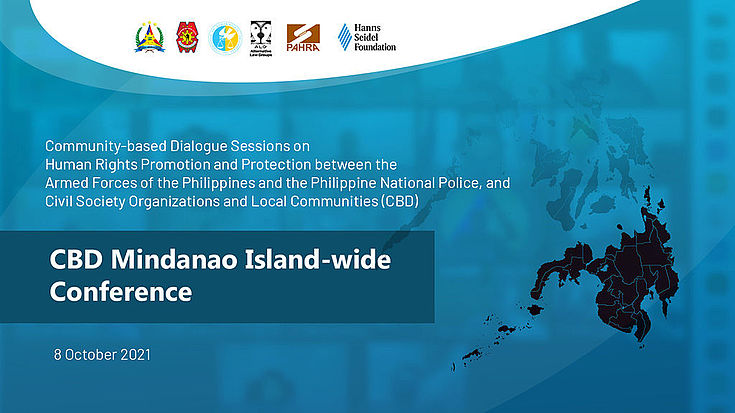Community-based Dialogues (CBD)
CBD holds Mindanao Island-wide Conference
CBD Mindanao island-wide conference
HSF
The objective is to share updates on accomplishments, challenges and gaps, strengths and best practices, and lessons learned on three (3) key areas: building collaboration among multi-stakeholders and institutionalization of the CBD program; addressing human rights violations; and human rights education, capacity building and advocacy.
The activity was attended by 43 participants from Mindanao including representatives from partner institutions at the national level (CHR, PNP, AFP, ALG, PAHRA, HSF).
CHR Commissioner Karen Gomez-Dumpit gave the opening remarks and welcomed the participants to the virtual conference. She briefly recounted the beginnings of the project and acknowledged the resolutions passed at the Regional Development Council (RDC) and Regional Peace and Order Council (RPOC) as well as at the local government unit (LGU) that seeks to institutionalize the CBD, in particular from Region X (RPOC No. 13, Series of 2017) and Region XIII or CARAGA (RDC No. 34-B). In addition, she noted the Memorandum of Understanding (MOU) that was signed by the CBD core group in CARAGA in 2018 that institutionalizes the core group and lays out the responsibilities of each member-organization to address human rights issues in the region and provide trainings and advocacy programs. She stressed the need to strengthen the group’s collective capacities and the CBD mechanism to ensure that the goal of the CBD project will be met.
The conference was a good opportunity to learn from the partners on their CBD activities and stakeholders involved on the ground.
In terms of achievements, strengths and best practices, they shared the following: signing of Memorandum of Understanding with respective core group in Regions IX and XIII, conduct of regular dialogues to surface issues for timely intervention (including in barangays), case referral, multi-sectoral/multi-agency approach, committed and cooperative members/agency representatives, harmonious relationship among members of the core group, existence of community counterparts to respond to cases brought up before the core group, conduct of orientation/training/education activities, conduct of needs assessment (SWOT) of CBD core group, active participation of stakeholders in the conduct of CBDs, sharing of resources (conduct of meetings and other activities, relevant information), strong commitment in fulfilling functions of a human rights protector (PNP), CSOs acknowledge the assistance/partnership with security sector in different activities, open communication, openness of security sector to work with CSOs, referral mechanism is effective and easy through the CBD network (Region XI), CBD module on civil and political rights used in Training of Trainers (ToT) in Bukidnon, strengthened and sustained convergence among CSO groups and concerned government offices, regular communication/ coordination, openness and willingness to resolve human rights violations
As to challenges and gaps, the following were mentioned: funding for core group projects, non-permanence of core group representatives (e.g., fast turnover of security sector representatives) which affects continuity/sustainability of CBD/projects, referral mechanism on human rights issues/cases, limited engagements due to COVID-19 restrictions, mistrust in government by some communities, profiling of CSOs, lack of personnel to conduct seminars, weak internet connection in far-flung areas, “red-tagging,” no unified reporting mechanism, communication barriers due to the COVID-19 pandemic
With respect to lessons learned and recommendations, they pointed out the following: continue conduct of regular meetings and activities, situation in various communities demand that engagements with the core group and the community should continue, strengthen partnerships, invite more CSOs to CBD activities, secure funding support from concerned agencies for core group activities, strengthen feedbacking and updating system on cases, consistency on collaborative meetings and activities, directory of partners, there should be more awareness on human rights among members of the AFP, PNP HRAO as separate unit with investigative powers, establish standardized reporting system, proper turnover to new core group members/representatives for continuity (e.g., share documents/information on the CBD with the security sector), make “BANTULA” – a provincial-level core group and AFP’s Community Support Program (CSP) active in implementing the CBD
After the open forum, CHR-XI Regional Director, Atty. Edmundo Albay delivered the closing remarks.

